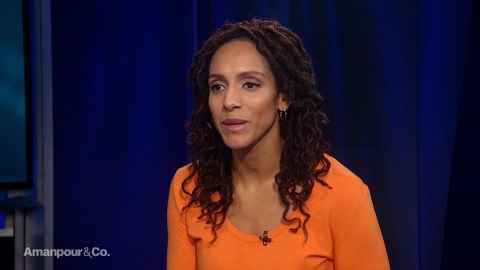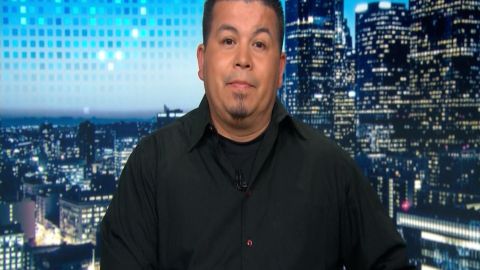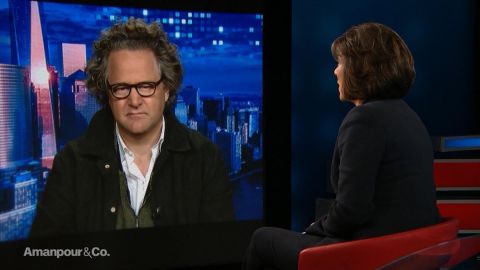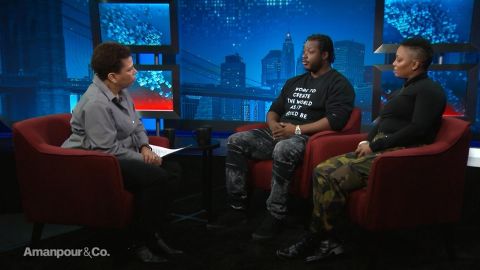Read Transcript EXPAND
CHRISTIANE AMANPOUR: And we continue on that theme turning to Charm City. It’s a documentary that highlights the epidemic of violent shootings and murders in Baltimore. And it highlights the people who are trying to change that.
(BEGIN VIDEO CLIP)
UNIDENTIFIED MALE: We got 171 dead black people. That’s not a state of emergency.
UNIDENTIFIED FEMALE: This is a dialogue to build our understanding between you all.
UNIDENTIFIED MALE: Gun violence is a disease and it should be treated as though.
(END VIDEO CLIP)
AMANPOUR: So that’s a short clip but our Michel Martin sat down with two people who are at the center of Charm City, Baltimore police officer Monique Brown and neighborhood peacekeeper Alex Long. Here’s their conversation.
MICHEL MARTIN: Major Monique Brown, Alex Long, thank you both so much for being with us. You both grew up in Baltimore. Am I right?
MONIQUE BROWN, BALTIMORE POLICE OFFICER: Yes.
ALEX LONG, BALTIMORE SAFE STREETS MEMBER: Yes.
MARTIN: Am I right? So I wanted to ask each of you what was it like when you were growing up. Alex, you want to start?
LONG: I really couldn’t tell that I had a bad upbringing until I was older, you know. So for me, my childhood earlier seemed excellent.
MARTIN: Nice Christmas, birthday parties.
LONG: Yes, all that stuff. And then once the drugs really took a hold in effect, that’s when things all went downhill.
MARTIN: What was the drug of choice then like? What was the — when you were growing up, what was the drug?
LONG: For my parents, cocaine. That was the main thing. They did a little bit of weed from time to time but it was mostly cocaine and it destroyed my family. Me and my sisters ended up in foster care. And from that point on, that’s when the journey downhill started for me because not only was things, you know, going to downward spiral but I was separated from my family. So I was really stuck figuring out who I was and which direction my life was going to take all on my own.
MARTIN: Major Brown, Monique, what about you? What was it like when you were growing up?
BROWN: Probably similar. Weekend, they party. Drug of choice for us was alcohol. Didn’t necessarily know that some of the things were going on were problems until you realize, hey, you know, you get a little older. And it’s like you almost didn’t pass 1st grade, 2nd grade, 3rd grade because we didn’t go to school on Mondays because they partied a lot on weekends. And then you start to take notice, OK, this is not right.
(BEGIN VIDEO CLIP)
BROWN: My mom used one coping mechanism to another, from marijuana to cocaine to alcohol to crack, ultimately to heroin and a mixture of methadone which eventually led her to her demise which was an overdose. So my kids, I pretty much just — I have to take them away from this environment.
(END VIDEO CLIP)
MARTIN: What made you want to become a police officer? I take it you didn’t have any police in your family.
BROWN: No. And growing up, we still have — those tensions were there. They weren’t separate or different than some of our dynamic that we deal with now. A lot of it was I didn’t always felt like there was someone around to always be a help, whether it was home or outside. You know, we come outside and this is like — this is — we’re just killing each other and this don’t make sense. I’ve always thought that I wanted to do something law wise. But even though you feel like you’re on a journey to do good things, as a young teenage mom, it’s like I can’t go to law school, I have kids. So you defeat yourself in that way but then you’re like what can I do to be helpful. And I just felt like somebody has to say like be a change because again the tensions were there.
MARTIN: Alex, I want to play a clip from the film where you talk about just how early the distrust or just how early the tensions between the police and citizens can take root and why. And I just want to play that clip and here it is.
(BEGIN VIDEO CLIP)
LONG: So I go to the store and we’re racing back. Police see me running and I become a suspect. This person said the person had on all black or grey hoodie. I got an orange and blue, a Knicks shirt, orange and blue boots, blue jeans, and an orange coat but it’s me because I’m running. He said (INAUDIBLE) so you’re scared. I said my hobby is running. If I was scared, it’s because you just grabbed me for nothing. Talking about I robbed somebody. So there’s the answers for your questions. He was like, “Yes, you’re wise. I got my man.” So I was charged with armed robbery, kidnapping. And I went in a little 15-year old kid. I came out like 260. I was a child with an adult record that did adult time. And I got adult size.
(END VIDEO CLIP)
MARTIN: Monique, I want to ask you, how do you feel when you see that and when you hear what Alex just said?
BROWN: It makes me upset. One of the things that we do taking this job is to make sure that we uphold the Constitution. We’re not — we don’t vary from that. So — and then not only that. I have a son. I have a son. My son is 24. I have nephews. I have a brother. And I have a lot of families that still lives in the city. So it was important. My coming on, of course, was hey, we have to get this right because, of course, of myself. I’m still African-American. I’m not exempt from that. The job is what I do but that’s not who I am. So that’s one of the things that I have to push. And I’ve always tried to push to make sure that you see us as being human, we’re not separate. And we have circumstances that kind of leads us to do bad things but they don’t make us bad people.
MARTIN: One of the things I noticed from the piece is that you said that when you joined the force, that that attitude that Alex was talking about was so widespread, that you even had friends when you told them that you were becoming a police officer —
BROWN: Yes.
MARTIN: — drops you as a friend.
BROWN: Instantly.
MARTIN: Instantly.
(BEGIN VIDEO CLIP)
BROWN: When I first decided that I was going to join law enforcement, a lot of my friends was just like, I can’t talk to you no more because you’ll be one of those boys. How could you, the way they treat us. They only want to lock us up. So that’s few things, two-folded. Most times, people don’t like the police, of course, because we have that right to take your freedom away. And then on the flip side, growing up in the neighborhood, in the areas that I did, it wasn’t fun either.
(END VIDEO CLIP)
BROWN: One of the things trying to plead my case was, well, how do we change anything if we went outside? We can throw stones, bricks, whatever, all day long. We can protest. We can be loud. Until we become inside of any avenue, agent, and whatever, I strongly believe if we want to change laws, we have to become judges. We have to become counsel people. We need to be embedded in every single entity that we feel as though we are not counted for. The only way our voices can be heard that we can bring that change that we feel will implement that change, we have to be a part of the whole system.
MARTIN: But one of the other things that you said is that you want to help people.
BROWN: Yes.
MARTIN: And that you also said a lot of people don’t see the good that you do.
BROWN: No.
MARTIN: That you feel that you — have you — do you feel that you are doing good?
BROWN: I pray so. The good isn’t always the narrative, right, especially when we’re in this uniform.
MARTIN: Alex, what you hear Major Brown say, people don’t understand the good that we do, how does that sit with you?
LONG: It’s true. I can honestly say that. It’s a huge misconception in the black community that police isn’t anything until you actually need a police officer.
MARTIN: Do you think that other people feel the way you feel that — because there’s some moments in the film when you’re not too pleased with the police. In fact, you can hear words which I cannot say on the T.V., even just people riding by, you hear them expressing unhappiness, right?
LONG: What we have to understand —
MARTIN: But do you think most people feel the way you feel like both end? It’s like —
LONG: Oh, yes.
MARTIN: — we need them. We need them.
LONG: They may not say it but if their mother is shot, their grandmother is raped or anything like that, I guarantee you they’d call the police. If somebody breaks into their car, they are calling the police. So a lot of times, we put on that facade that we don’t — keeping that look, you know. But deep down, we’re a society that’s suffering. If you can’t turn to the people that are supposed to help you, you’re almost forced into a Wild Wild West situation.
MARTIN: So is this — I mean I hate to ask it this way but I have to ask, is this something about Baltimore? Because we are speaking now like a fourth candidate for the police chief has withdrawn. I mean so —
LONG: Baltimore has been sold off to the highest bidder for about 40 years now, if not longer. So the residents of Baltimore really don’t have any type of hope or chances at anything unless you have a trust fund unless you have somebody that can put something aside for you. Outside of that, pretty much no hope. And when you look at Baltimore, that’s why you see so many youths that they have given up. The school system don’t believe in them. They refuse to put any money into the schools to educate, to renovate or do anything. So you’re telling the kids — you look at what they feed them. And most of the kids come home talking about they get peanut butter and jelly for breakfast. So you’re feeding these kids like (INAUDIBLE). You’re treating them like their social service clients. And you’re telling them, keep your head up, have hope for the future when they know deep down there is no future in the city for a person that looks like me.
MARTIN: One of the things that the film does do, and I hope people get to see it, is that it does show that people aren’t just giving up, that people are every day doing what they can do. You could have given up after you went through what you went through. I mean some people would be so angry at being falsely accused and having to do time for something that they didn’t do. They’d just be so filled with rage. They’d want to look to take it out on somebody for the rest of their lives. So what made a difference for you?
LONG: It really didn’t. All the things that you just said, I went through those processes myself. For years, I was angry at the world for real because I felt like I was unjustly convicted of something that the victim even said that I didn’t do, that the victim even said she have never seen me before. So that made me so enraged but then I realized at the end of the day, I’m playing right into the hand of that “system”. A lot of times when you get emotional, you tend to do things that sabotage yourself. I don’t want that no more. My father was in prison. My mother was in prison. My aunt was in prison. So that was a common thing. My father had all the athletic ability in the world, had scholarship offers and everything, he chose the streets. I’ve seen where that put me and my family. So I realized at the end of the day, the only way where I would be able to get ourselves out of where we don’t want to be is by actually getting ourselves out of those situation.
MARTIN: One individual that really moved me in the film was Mr. C.
LONG: Oh, that’s my O.G. That’s my O.G. I got a lot of respect for Mr. C. He showed me and helped open my eyes on the responsibility that one owes in this community.
MARTIN: And he used to be a corrections officer.
LONG: Corrections officer.
MARTIN: And now he runs —
LONG: And now he runs Road Street Community Center.
MARTIN: A community center and you started working there.
LONG: Yes. I’ve been working with Road Street Community Center for about 15 to 16 years.
MARTIN: Let’s just play a short clip and we’ll hear what he has to say.
(BEGIN VIDEO CLIP)
MR. C: We can’t give up. Can’t give up. Things are going to get better. But you got some people that don’t believe that. I cannot fall into that unbelief that things are not going to get better. I can’t believe that Brandon is not going to make it to seven. I see Brandon, a 70-year-old man, gray hair, might have a cane. Yes. You’re going to have a few more pounds on you. But I see you at seven. I see her at 70-year-old, four kids, six grandkids. All right. I see that when I look at you all, right. I see you all in the future.
(END VIDEO CLIP)
LONG: And, you know, believe it or not, that was actually the day after my little sister Ashley was killed. And, you know, that was a message to the community but, you know, kind of to me personally, you know, not to lose focus and I say get too emotional over the situation. Because it’s during those times where I can destroy not only myself but my whole family.
MARTIN: I’m so sorry about your sister.
LONG: Appreciate that. She definitely still is smiling down. I believe that’s why I’m here today.
MARTIN: Can I ask what happened?
LONG: Unfortunately, she kind of got into a fight with [13:50:00] somebody she considered a friend, somebody that she allowed to stay in her house and all that. And it, you know, quickly escalated and ended up turning to her homicide.
MARTIN: A friend killed her?
LONG: The friend didn’t but her son did. He then took her life and he then lost his life because he was found guilty on all charges. So I say that’s two lives lost for absolutely nothing at all outside of, and again I say it, being emotional.
MARTIN: I apologize for asking but I have to ask, did you ever want to retaliate?
LONG: Definitely.
MARTIN: Why didn’t you?
LONG: Because once again, like I said earlier, that’s that trap. That only sends us deeper and deeper down the rabbit hole. To me, it wasn’t worth it, you know. I’m going to find another way and I found another way to honor my sister, to make sure that her legacy lives on, her name lives on, and it ain’t through blood.
MARTIN: Also the course of time that the film was even being made, 1,000 people were killed in Baltimore. And I think some people might think that that’s the drug war or turf wars or —
BROWN: Some of that but most of it is to tell a story and a lot of it is trauma. The trauma affects us from a community because that community may be struck with violence most of the times. And we — the law enforcement are first responders as well because we’re always coming, we’re answering the call to come to aide as best as we can after those incidents happen. And we’re not dealing with that across the board at all. Therapy is not there. We’re not communicating and we’re not telling our kids hey, this is not the way that we solve problems.
MARTIN: There’s a councilman in the film who is quoted as saying that this is a public health crisis. Do you agree with that?
LONG: I agree.
MARTIN: You both agree with that?
BROWN: Yes.
LONG: Absolutely. In my particular field, I work for Safe Streets. Safe Streets is originally set up and designed to reduce homicides in communities So we go out to particular hot spots. We’re not throughout the city like most people would think. This is four sites in Baltimore and we’re really in hot spots in the cities. And what we do is we go into communities and we find guys that’s respected in a community on a street level. So businesses would say don’t give that man a job. But with our field, we realize that it’s going to take that community to heal and fix their community.
MARTIN: A lot of times, when I interview mayors or leaders in cities that are having a crisis like a flood, you know, or hurricane, right, a lot of times we ask them what do you need. What do you need? And so I’m going to ask you, you know, what do you need?
LONG: Honestly, personally, I just need opportunity for my kids. Be it educational, the workforce, or whatever we’ve got to find ways to give our kids other avenues to success. Like I say, if that happens, man, the sky is the limit for us. We’re way too bright of a group of people. Our minds expand way beyond anybody’s imagination. So that’s not a problem. It’s just the opportunities that we’re actually given and provided need to change. And I say, to me, that will really change everything.
BROWN: I would say to some degree we have to figure out how do we bring our kids and enough to touch them because I feel like all of us are failing them. Most certainly, they need education, you know. And getting them to understand that they are these diamonds that we always uncover. So many people give up on us because of the neighborhoods we come from. They hear, oh, you came from, you know, and this is like, OK, well, what’s the story? All of us have one. We need more mentorship. We have a lot of people great grassroots foundations that’s in the city that’s now working trying to get with our kids and bring them onboard to a lot of things. But it may just be a community thing. Walk out, find a kid and say, hey, listen, how can I help you?
LONG: That’s right.
MARTIN: That’s a great place to end. Alex Long, Major Monique Brown, future chief, thank you both so much for talking to me.
BROWN: Thank you.
LONG: Thank you for having us.
BROWN: Yes.
About This Episode EXPAND
Christiane Amanpour speaks with furloughed Fire Captain Mark Munoz; British Justice Minister Rory Stewart; author Afua Hirsch; and director Florian Henckel von Donnersmarck. Michel Martin speaks with Baltimore Police Officer Monique Brown & Alex Long about “Charm City.”
LEARN MORE



